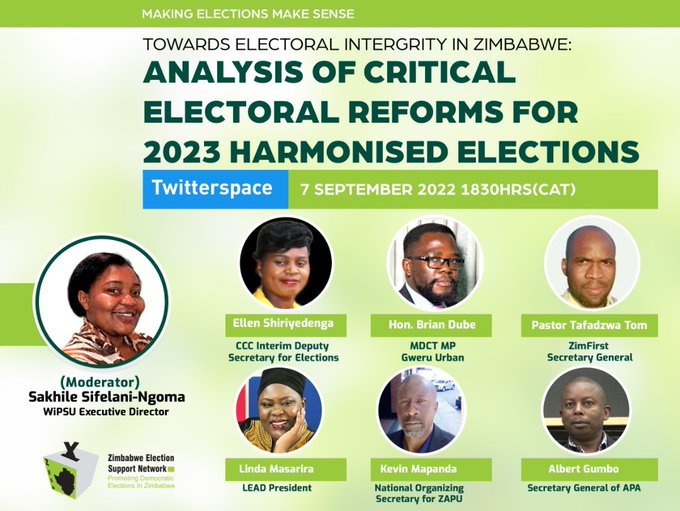|
Getting your Trinity Audio player ready…
|
On Wednesday 7th of September 2022, the Zimbabwe Election Support Network (ZESN) hosted a Twitter space Discussion on the topic “Towards Electoral Integrity in Zimbabwe: Analysis of Critical Electoral Reforms for the 2023 Harmonised Elections. “The objectives of the discussion were to establish the gaps in electoral reforms that need to be implemented in Zimbabwe before the 2023 Harmonized Elections and to proffer recommendations on enhancing electoral reform efforts in Zimbabwe.
Panellists were drawn from different political parties in Zimbabwe and these included Ellen Shiriyedenga the Elections Director for the Citizens Coalition for Change, Hon Brian Dube the Movement for Democratic Change –T (MDC-T) Member of Parliament for Gweru Urban, Pastor Tafadzwa Tom the Secretary-General for the Zimbabwe First (Zim First) party, Linda Masarira the President for Labour, Economist, African Democrats (LEAD), and Kevin Mapanda the National Organising Secretary for the Zimbabwe African People’s Union (ZAPU). The discussion was moderated by Sakhile Sifelani- Ngoma the Executive Director for the Women in Politics Support Unit (WIPSU).
The meeting discussed the process and content of electoral reforms that need to be instituted before the 2023 Harmonised Elections to ensure an improved electoral environment for polling. All panellists agreed that electoral reforms are necessary and urgently needed in Zimbabwe if the country is to ensure an even playing field in the 2023 elections. Linda Masarira urged all political parties to come together and speak with one voice regarding the reforms needed, while Ellen Shiriyedenga lamented the lack of adequate dialogue on the subject amongst political parties. She also noted that the recommendations made by Election Observer Missions (EOMs) after the 2018 elections have not been implemented or seriously considered. All panellists agreed that the first point towards the realisation of the needed reforms would be a dialogue between electoral stakeholders including political parties and that electoral reforms can be passed even at the eleventh hour as it is all about the political will and not about time.
Panellists mentioned several aspects that need reform before the next elections and these include the need to ensure that the Right to Vote is instituted for all citizens, including extending special voting provisions to citizens who will be on duty on election day as well as extending the right to vote to those in the Diaspora, prisons and those in hospital. The need to ensure the ease of voter registration and enhance access to it was also emphasized.
Political party registration and regulation were also discussed in the meeting. Generally, panellists noted that the idea of registration and regulation of political parties as noble in principle as it helps to keep political parties accountable and in check, but the emphasis was put on the fact that the regulation mechanisms must be reasonably justified in a democratic society, and that much thought must be put into ensuring the independence of the Regulator or Registrar of Political Parties and the implications of what the registration will do to the political parties.
Regarding the proposed nomination fees for Presidential, National Assembly and Local Authority candidates, panellists noted that the fees are too high and prohibitive. One of the panellists, Hon Brian Dube was of the opinion that the Zimbabwe Electoral Commission (ZEC) must not act outside the will of the people and that the substantive decisions that it makes must always be done in consultation with the people of Zimbabwe.
Panellists also spoke about the effectiveness of the Political Actors Dialogue (POLAD), a platform created by President Emmerson Mnangagwa following calls for the need for dialogue with the opposition to find solutions to the country’s problems. The platform was launched on 17 May 2019 by the President. At its inception, 17 leaders of opposition parties that had contested the 2018 elections joined but the then main opposition, The Movement for Democratic Change, did not join the platform. Hon Brian Dube observed that the platform is not inclusive and therefore there is a need for a better platform which is more consultative in nature.
Another panellist, Linda Masarira recommended the use of the Proportional Representation (PR) Electoral System, over the First Past the Post System (FPTP). She noted that the PR system will ensure that the distribution of seats corresponds closely with the proportion of total votes cast for every party during elections. PR system offers a better chance of representation to smaller parties and gives minority parties and independent candidates a better chance of winning seats in parliament. She claimed that the FPTP is unrepresentative as candidates can be elected with a very small share of the votes while other votes cast are wasted.
Another electoral challenge that was discussed was the issue of assisted voters. Ellen Shiriyedenga described it as “command voting” arguing that it is often used as a ploy to intimidate and coerce voters to vote in a certain manner. She gave recent examples of the Gokwe-Kabuyuni and Chipinge by-elections where high numbers of assisted voters were recorded. She recommended that the ZEC maintain very high levels of transparency in their work, including commissioning independent audits of the voters’ roll as was recently done in Kenya before their most recent General Elections.
Other areas identified as needing reform discussed in the meeting were the independence of the judiciary, the security sector, the bureaucracy and a biased state media, which often all contribute to an uneven playing field when it comes to elections.
When the discussion was opened to the floor, participants expressed their sentiments on the critical outstanding electoral reforms. Participants questioned the appetite that electoral stakeholders have for electoral reforms, noting that the subject has not yet gained much traction in Parliamentary debates.
The public discussion was followed by over a hundred people who tuned in live through Twitter Space. It was a great success as evidenced by the high level of engagement by both panellists and those who were following the discussion.
